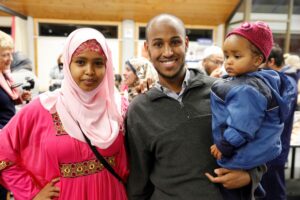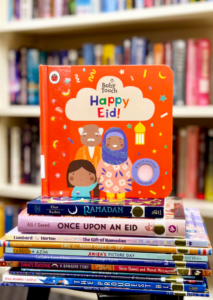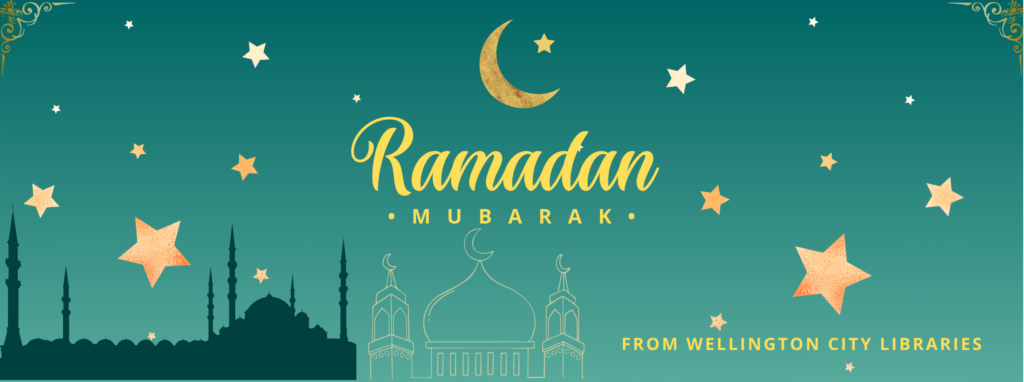Ramadan Mubarak to our Muslim whānau
Kia ora kids! We know some of you might like to know more about Ramadan.. or some of you might not even know what Ramadan is. Luckily you are in the right place. Libraries are great places to learn about different religions, cultures and important celebrations that happen all over the world, including in Aotearoa, New Zealand.
What is Islam?
Ramadan and Eid are important events in the religion called Islam. People who follow Islam are called Muslims. There are about 1.9 billion (!) Muslim people all over the world. We think you will agree that is a lot of people – its roughly a quarter of the Earth’s total population!
Why is it good to learn about Islam?

A local Muslim family celebrating Eid al-Fitr at Newtown Library
As the world comes together and people mix more and more, it’s good to learn about religions and cultures that maybe different to your own. You may be Muslim yourself, have a Muslim friend, or classmate, or you may not know any Muslims. But we can all learn more about Islam. Like many religions, Islam has lots of ancient wisdom and practices that help its followers to be peaceful and kind people.
Ramadan is one of the most sacred times of the year for Muslims, it is a time when people remember the prophet Muhammed who received the first verses of the holy book the Qur’an. Ramadan lasts for 1 month and is a time when people fast, which means they do not drink or eat from sunrise until sunset, every single day for 4 weeks! In the evening they break the fast with a special meal called the Iftar and visit family and friends.
Why? Not eating anything means that you get to practice not getting everything you want. It can be very difficult to go without food and water, so it helps you to develop a strong mind. It helps Muslims to focus on family, kindness and helping others. Most importantly Ramadan is a time spent being quiet and reflecting on Allah (God).
At the end of Ramadan the fast is broken with a big celebration called Eid al-Fitr. Eid is an Arabic word meaning “festivity”.
Celebration Collection

Just some of the fantastic books you can find in our Celebration Collection for Ramadan and Eid!
In the Library we have a new Celebration Collection for Ramadan and Eid. This means we have a lot of beautiful new books about Ramadan and Eid al-Fitr that are available at this time of the year.
As part of this special collection, we have over 60 books about Ramadan and Eid written by Muslim authors, as well as many books with Muslim characters. These books are for kids of all ages, from babies all the way up to intermediate-aged readers.
Here are some you may like to read:
Children’s books about Ramadan and Eid al-Fitr
The proudest blue : a story of hijab and family / Muhammad, Ibtihaj
“Faizah relates how she feels on the first day her sister, sixth-grader Asiya, wears a hijab to school.” (Catalogue)
In my mosque / Yuksel, M. O.
“A picture book featuring culturally rich artwork celebrates the joys, rituals, and traditions that are practiced in mosques throughout the world, and includes a glossary and information about many historical and significant mosques.” (Catalogue)
 Aya and the butterfly / Salama, Maysoon
Aya and the butterfly / Salama, Maysoon
“Aya and her grandad grow swan plants in their garden. Dedicated to the children and whānau of the Aotearoa New Zealand Muslim community, whose lives were changed forever on 15 March 2019.” (Catalogue)
Once upon an Eid : stories of hope and joy by 15 Muslim voices
“Eid: The short, single-syllable word conjures up a variety of feelings and memories for Muslims. Maybe it’s waking up to the sound of frying samosas and simmering pistachio kheer, maybe it’s the pleasure of putting on a new outfit for Eid prayers, or maybe it’s the gift giving and holiday parties to come that day. Whatever it may be, for those who cherish this day of celebration, the emotional responses may be summed up in another short and sweet word: joy.” (Adapted from Catalogue)
Like the moon loves the sky / Khan, Hena
“Illustrations and prose inspired by the Quran celebrate a mother’s love and hopes for her child.” (Catalogue)
Sadiq / Nuurali, Siman (series)
“When Sadiq’s father leaves on a business trip, he worries he’ll miss his baba too much. But Baba has a story for Sadiq: the story of the Desert Star. Learning about Baba’s passion for the stars sparks Sadiq’s interest in outer space. But can Sadiq find others who are willing to help him start the space club of his dreams?” (Catalogue entry for Sadiq and the Desert Star)
Planet Omar / Mian, Zanib (series)
“Welcome, readers, to the imaginative brain of Omar! You might not know me yet, but once you open the pages of this book you’ll laugh so hard that snot will come out of your nose (plus you might meet a dragon and a zombie – what more could you want?). My parents decided it would be a good idea to move house AND move me to a new school at the same time. As if I didn’t have a hard enough time staying out of trouble at home, now I’ve also got to try and make new friends. […] The only good thing is that Eid’s just around the corner which means a feast of all my favourite food (YAY) and presents (DOUBLE YAY).” (Adapted from Catalogue)
Community languages
Please note: We also have books in different community languages about Islam, Ramadan and Eid, including Arabic, Farsi, Somali and Bahasa Malaysia.
Please do come into our libraries for some quiet time and ask us about anything you may need help with.






